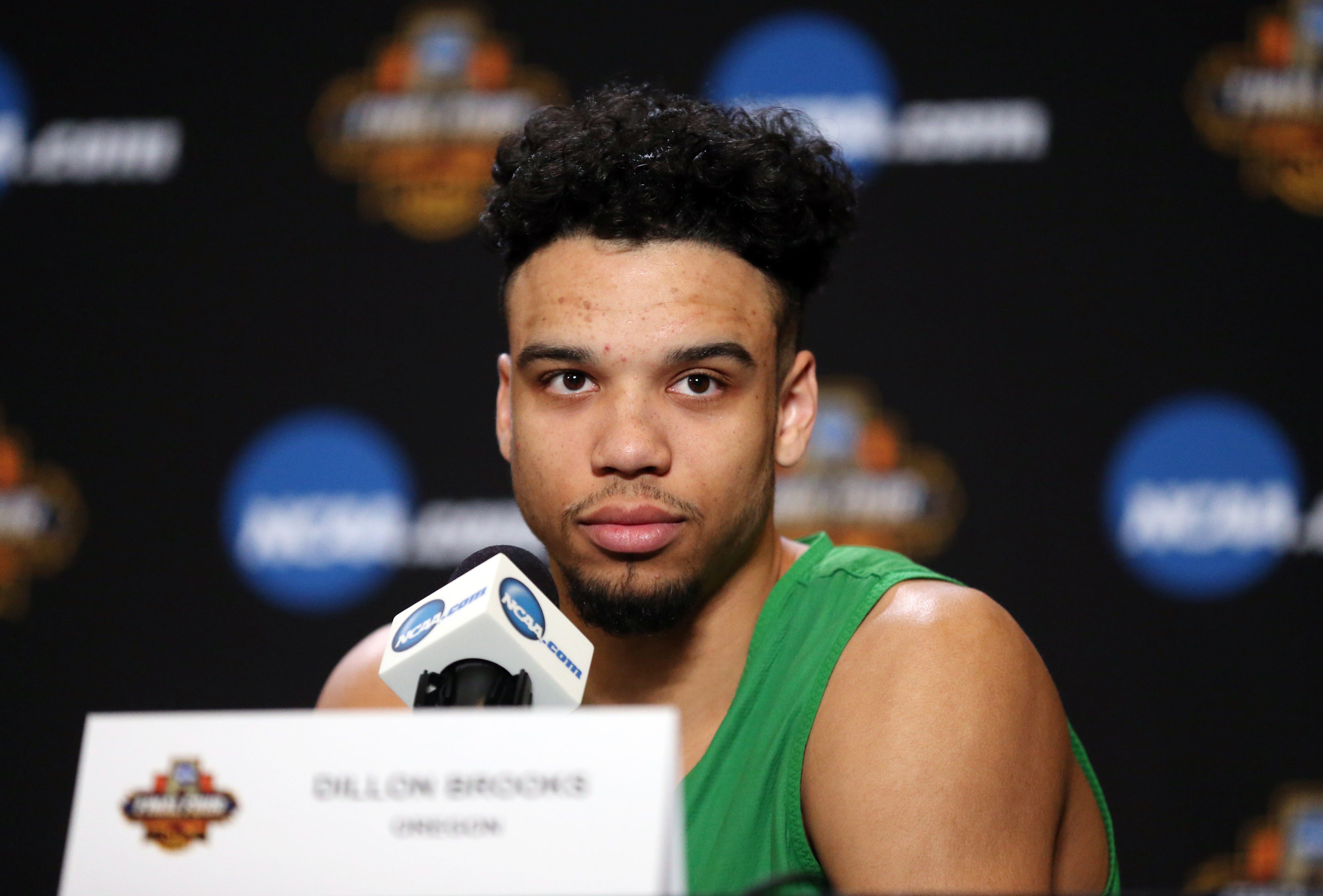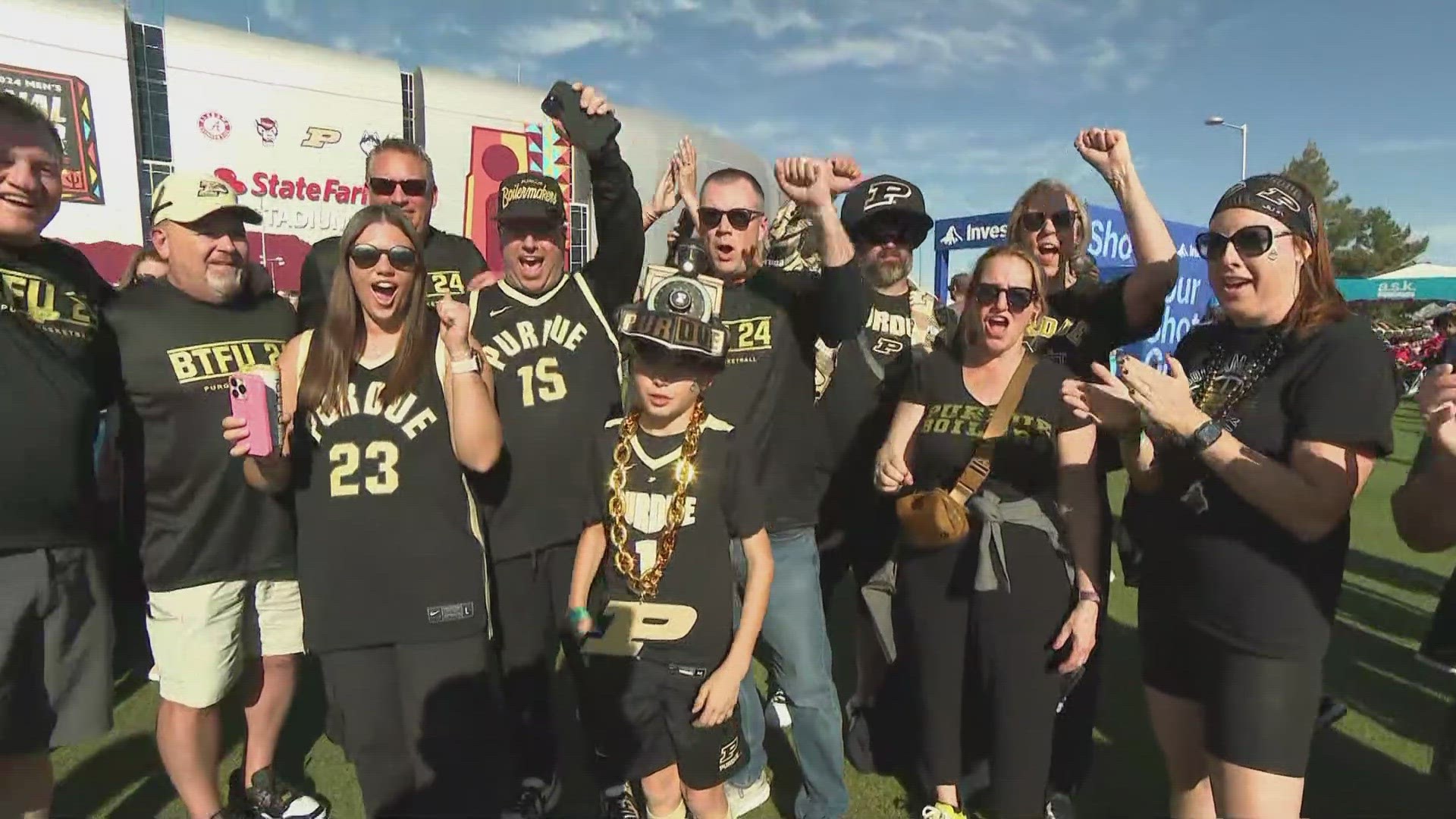GLENDALE, Ariz. — They just call it “the flop,” and this season at least, no explanation might be necessary. Dillon Brooks’ overcooked acting job in late January went viral everywhere — including the Oregon locker room.
“It’s saved on my phone,” said Ducks guard Dylan Ennis said, laughing — because that’s what everyone does, every time they see it.
“I still watch it to this day,” junior forward Jordan Bell said. “It’s funny. I watch it all the time.”
If Brooks bristles at the topic, it’s not for long. What’s often lost is that he scored 19 points that night at Utah, helping Oregon stave off an upset bid. And that while the Pac-12’s Player of the Year is not a fan of discussing the flop, he’s perfectly fine with being cast as something of a cartoon character in opponents’ arenas.
Just call him Villain Brooks. He’s cool with it. And he won’t be surprised if, come Saturday against North Carolina, he becomes everybody’s least favorite player.
“It probably will be where 65,000 or 60,000 do not like me,” said Brooks, referring to the crowds expected at University of Phoenix Stadium for the Final Four. “It doesn’t matter to me. I play the game. The crowd is gonna cheer for who they want to cheer for, but I’m there to win the game.”
The 6-7 junior forward is one of the biggest reasons Oregon has won a school-record 33 games, and why the Ducks, in the Final Four for the first time since winning the first NCAA championship in 1939 (when it was an eight-team tournament), have a great shot to win two more games and hoist that second trophy.
His versatility, pulling up for three-pointers or muscling inside for baskets, causes extreme matchup issues for opponents. But a developing ability to modulate a fiery intensity has been important, serving as propellant for the Ducks.
There was an ejection Jan. 7 at Washington State for kicking an opponent in the groin, or the technical foul for taunting in a second-round NCAA victory against Rhode Island. But also among Oregon’s season highlights: Brooks’ buzzer-beaters in victories over UCLA and at California. He wanted the ball. He delivered.
“The passion and the relentlessness I have for the game is what keeps me going,” Brooks said. “It’s what makes me play so hard and that’s why I play with an edge, that’s why my teammates play with an edge ... and you know, it’s been working tremendously with this team.”
When Brooks was a freshman, Oregon coach Dana Altman said, “he’d get going way too fast.” Worried he might careen out of control, Altman would pull Brooks from games and sit him for five minutes just to settle him down. That wasn’t a luxury; it was clear early Brooks would be an important cog.
Brooks, Bell and junior guard Casey Benson are part of a nucleus that arrived as freshmen in 2014 and, in Brooks’ words, “rebirthed” the program. They won the Pac-12 a year ago and reached the Elite Eight. And although Brooks flirted with the idea of leaving for the pros, he returned in part, he said, because “I want to win a national championship.” That they’re positioned to do so is in large part a testament to Brooks’ maturation.
“Over the years, he’s gradually gotten better,” Altman said. “It’s a fine line. What makes him a very good player, a player that loves the big moments, is because of that love of the game, his work ethic, his confidence. So as a coach you don’t want to take any of that away, but you’ve got to balance it. and I think he’s done a better job each year.”
The flop wasn’t the first time college hoops had taken notice of Brooks for more than buckets. A year ago, after Oregon drilled Duke in the Sweet 16, Mike Krzyzewski stopped him in the postgame handshake line. Brooks, who scored 22 points in the victory, had taken and hit a three-pointer with seven seconds left in the game and victory secured. The shot clock was about to expire; Altman said afterward he told Brooks to shoot rather than commit a turnover. But in the first half, after a three-pointer, Brooks had turned toward the Blue Devils’ bench to celebrate.
“He just told me that I’m too good of a player to be showing out at the end,” Brooks said Krzyzewski told him. “And he’s right. I’ve got to respect Duke.”
It was briefly a kerfuffle, inflamed when Krzyzewski denied during a postgame interview session that he had challenged Brooks. Krzyzewski later apologized.
“It helped me,” Brooks said Wednesday. “I’d never had that national attention before, so I thanked Coach K for (the advice). Now I’m prepared and ready. I’ve been through stuff this season that’s been getting national attention.
“And I’m still playing well and I’m still playing like me and I’m not changing a thing.”
The Ducks don’t want him to. And if opponents and their fans don’t like it, so be it.
“People called Kobe (Bryant) a villain because he played with so much passion and so much intensity,” Bell said. “That just comes with it. It’s something he’s got to accept.”
He’ll also have to accept that “the flop” isn’t going away even in Oregon’s locker room. “He had a hard time living that one down,” Altman said, and Ennis said he’s seen it so many times, he can break it down frame by frame.
“The guy pushed off a little bit,” Ennis said. “But it was a foul on Dillon. Then he just (takes) one, two steps — ‘All right, let me just jump onto the court’ — and he just fell back.”
He laughs. How can you not? And while the flop stands — or flops — alone, sometime Saturday it’s likely Brooks’ passion and intensity will rev toward the red line, maybe past it. He might shush the crowd, or talk some trash, or even over-dramatize a foul. Get used to it.
“People can say, ‘Hey, why is he doing that stuff?’ ” Ennis said. “But crazy as it sounds, if he didn’t have those antics, he wouldn’t be Dillon Brooks — and we love him for it.”


